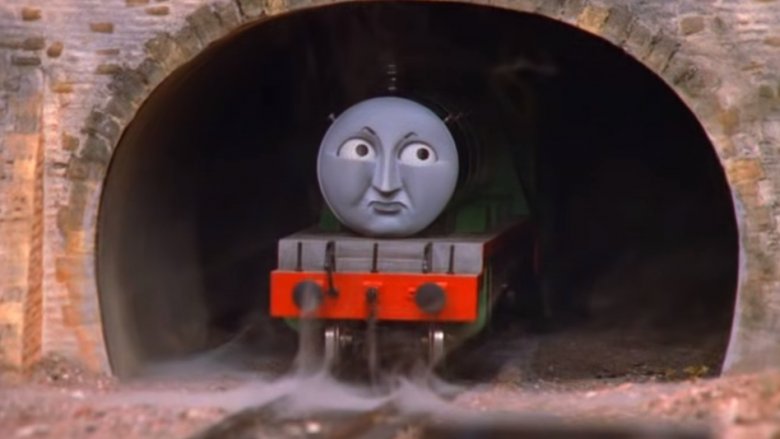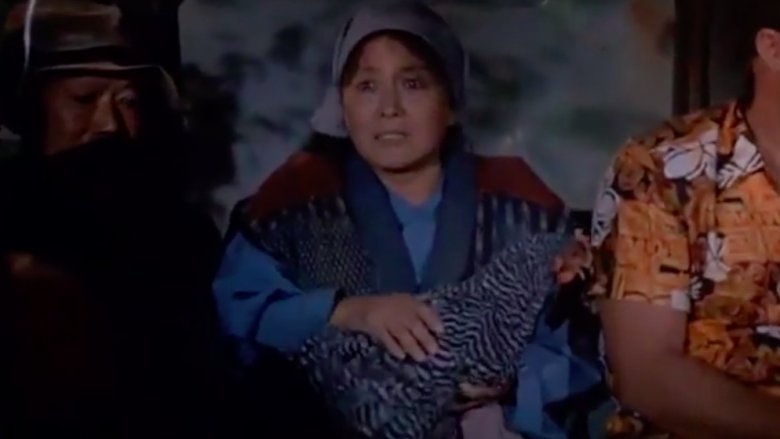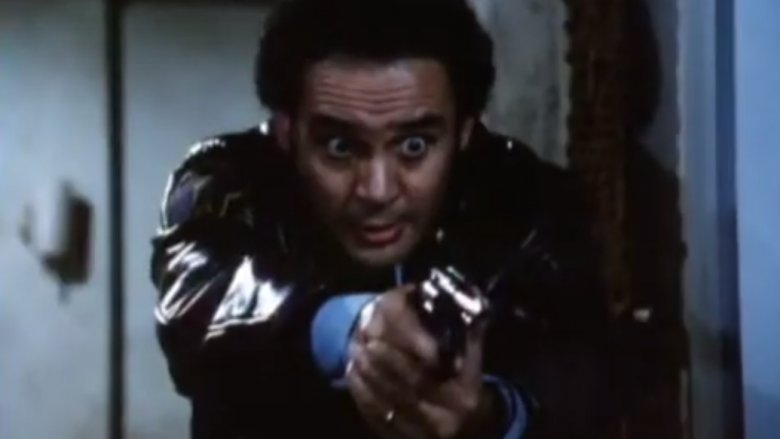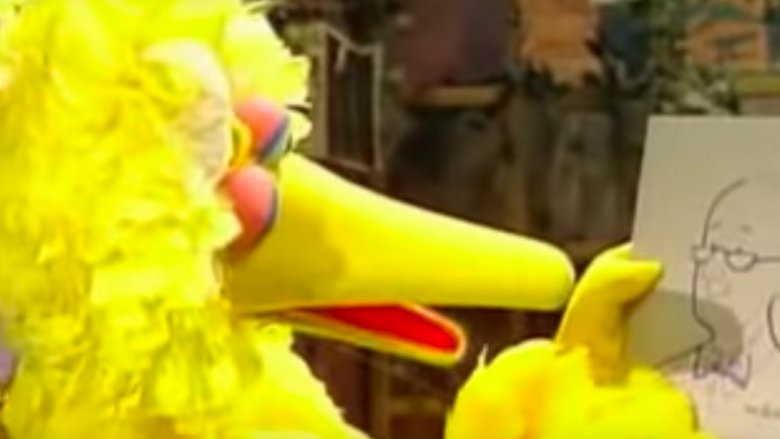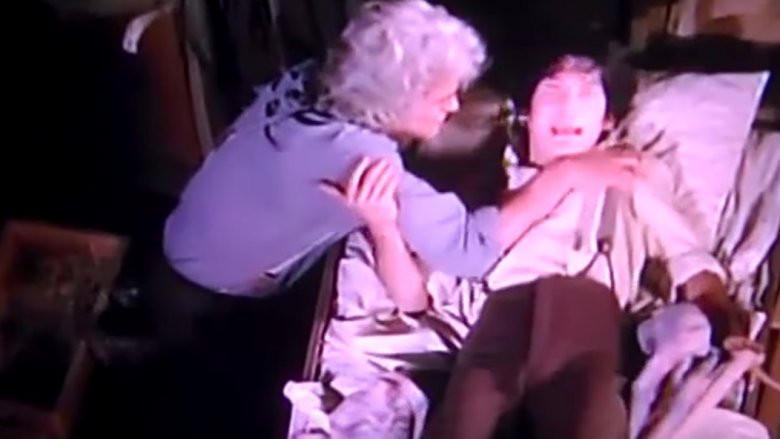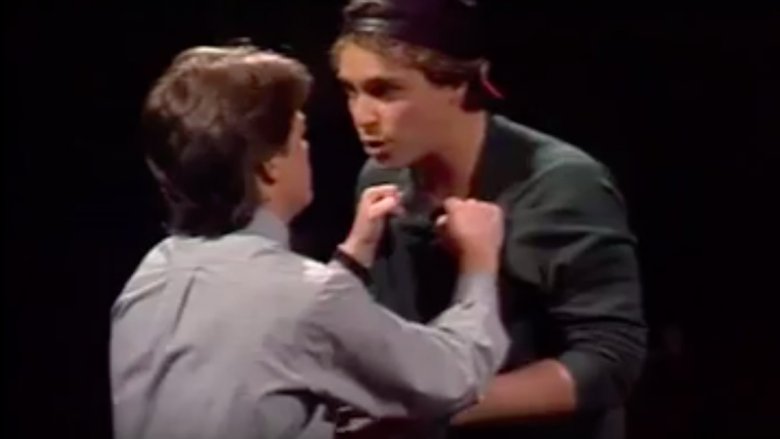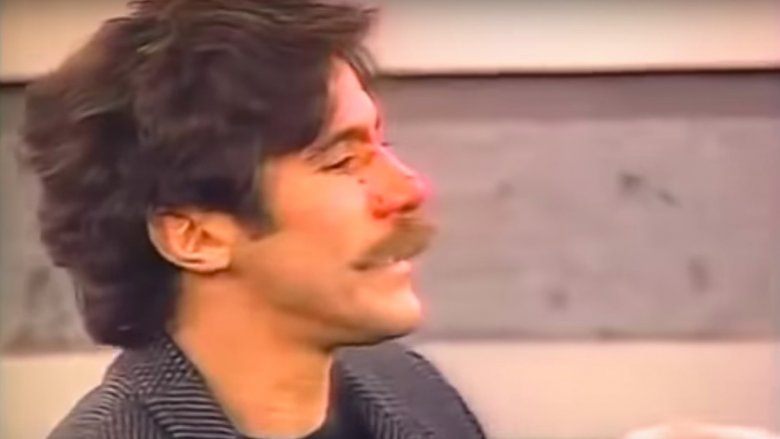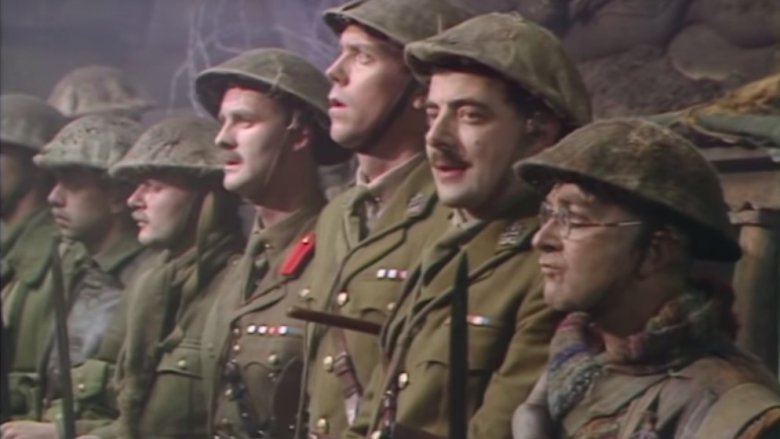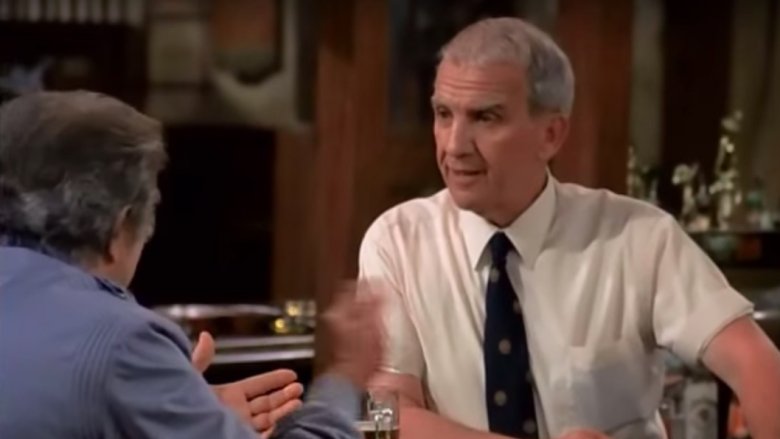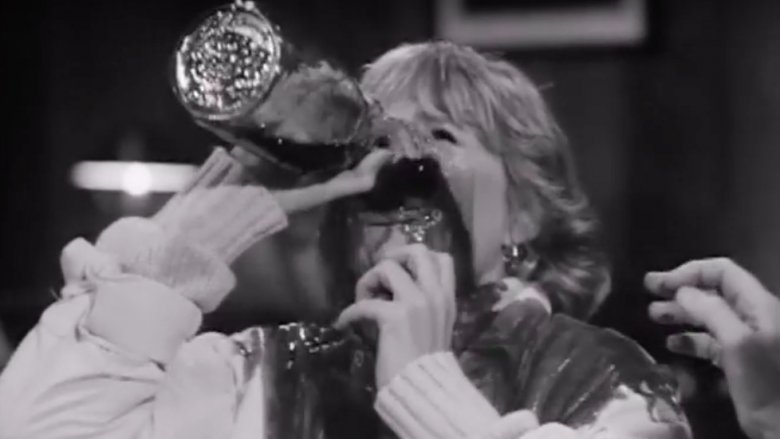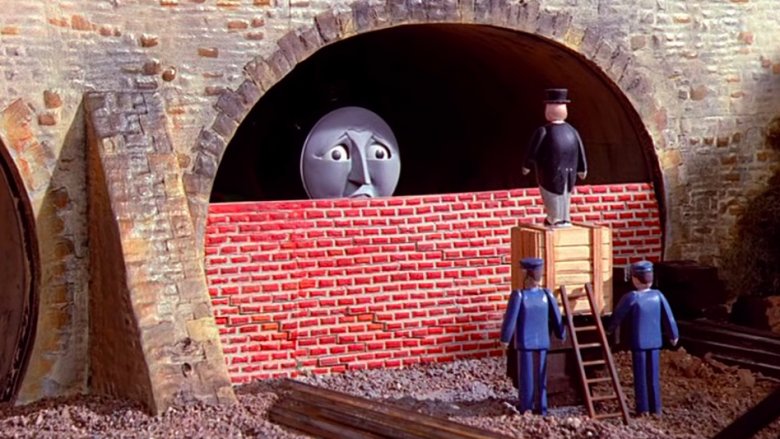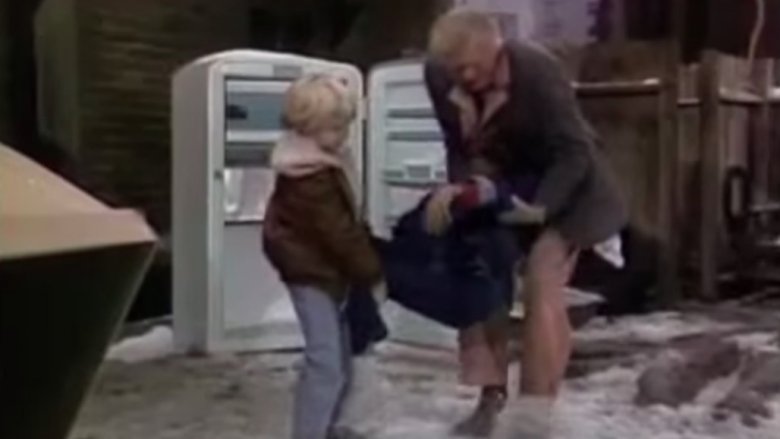The Darkest TV Moments From The '80s
Ah, the '80s. Big hair, acid-washed jeans, VHS tapes, nuclear attack drills — what's not to love? Besides everything. Well, there was some good music in the '80s, if you can still hear it through the sound of your hysterical laughter because you forgot how ridiculous the musicians looked with their tight leather pants and enormous hairdos.
But the worst, worst thing about the '80s (at least culturally, because you can't really compare any of this awful stuff about the 1980s to big bads like AIDS and the Cold War) was the Very Special Episode. If you were a kid growing up in the 1980s, you know exactly what we're talking about. The Very Special Episode was that horrible, awkward, dark and disturbing episode designed to teach viewers an important lesson about whatever moral problem was dominating the headlines at the time. You know, the episode that your parents made sure you watched because they didn't want to actually have to talk to you about that stuff with their own mouths.
Very Special Episodes made for some dark, dark moments in 1980s television. Heck, there were even some dark moments in 1980s television that weren't labeled "very special" and yet still haunted our nightmares well into the '90s. So just in case you've forgotten, here are some "very special" and not-so-very special episodes of '80s shows that made for some very dark television indeed.
And because war is funny...
Wait, no, war is not funny. Nothing about war is really funny. And yet, for 11 years Larry Gelbart's story of an Army hospital during the Korean War not only managed to be funny but also meaningful, which probably explains why it stayed on television for more than a decade.
But it's war, so it can't all be laughs and cross-dressing. According to AV Club, the dark and disturbing last episode of M*A*S*H, which aired in February 1983 and is entitled "Goodbye, Farewell and Amen," centers in part around leading character Hawkeye recovering from a mental breakdown. In the pinnacle scene of horror, Hawkeye is flashing back to the source of his mental anguish — he's on a bus, the enemy is nearby, and the passengers have to kill the lights and remain silent or risk discovery.
But there's a woman on the bus who has a chicken, and the chicken won't stop making noise. Hawkeye tells her to shut the chicken up and she does ... by smothering it. Okay that sucks but then in the next scene we learn that it wasn't actually a chicken, it was a baby. Line: crossed.
You can argue about whether this baby-death scene was done well or done badly but it doesn't change the fact that everyone who saw it is still in therapy.
When a Hill Street Blues cop shot a little kid
The '80s was famous for those important and not-at-all-disturbing "Very Special Episodes," but they were also famous for the "ripped from the headlines" episodes. Hill Street Blues was maybe not as guilty of this as its descendant Law & Order, but it did have an episode or two that featured storylines right out of the news. Because evidently, it's just way too hard to come up with original crime stories or something. Anyway, according to the Los Angeles Times, in March 1983, an officer performing a welfare check in a darkened apartment shot a 5-year-old boy who was playing with a toy gun. Then in November of that same year, Hill Street Blues aired an episode entitled "Doris in Wonderland," which included a storyline about a cop who mistook a boy with a toy gun for a burglar and shot him. In the real-life story, the boy's mom accepted a $395,000 settlement from the city and in the fictional version the mom forgave her son's killer. So it was a feel-good story? Maybe?
Sadly, this ripped from the headlines episode didn't really help society understand and prevent this kind of accidental killing — today cops are still accidentally killing kids with toy guns, especially now that toy guns look pretty much exactly like real guns (the orange tip can be painted over, oh toy manufacturing geniuses).
When kids learned about death from Big Bird
Okay, so death is part of life and everyone over the age of, say, 8 understands this, and we all come about this knowledge in different ways. Maybe it's the death of a goldfish. Or something more awful, like the death of a family member. Or maybe parents just decide it's time to sit down and have that conversation. One thing's for certain, though, parents sure as heck don't want their kids learning about death from a giant creepy yellow ostrich. (Is Big Bird an ostrich? Or is he like some Chernobyl-spawned parrot who fell into a vat of lemon sherbet?)
Anyway, according to AV Club, after the untimely death of Will Lee, the actor who played Mr. Hooper the grocer on Sesame Street, someone on the show got the brilliant idea that they should just make his character die on the show, too. You know, wedge it solidly between The Count's lesson about the number 12 and Cookie Monster's latest snickerdoodle rampage. So in a November 1983 episode, Big Bird and friends said "Farewell, Mr. Hooper" and then moms and dads everywhere had to deal with the fallout.
Okay, yes, Sesame Street is all about teaching moments, but isn't it a little blindside-y to drop that on kids and parents right as the holidays are getting started? Way to executive-decision the parents of America, Sesame Street.
Opium Den on the Prairie
Little House on the Prairie was good, wholesome television. Each episode was a lesson in proper behavior, complete with characters you love to hate and tragedies that can always be fixed with a little family togetherness. But even Little House on the Prairie was guilty of sometimes taking it too far, like in that one episode with the orangutan (yes, a literal orangutan) and the one with the donkey-riding competition, which granted were really just stupid and not so much "are you kidding me right now?"
But then they did an episode where Albert Ingalls moves to the city and comes home a drug addict. Yep, that's wholesome family entertainment right there. And it's not like his morphine addiction was even plausible or anything. He didn't get addicted because he needed it for pain, he got addicted so he could fit in with the big city in-crowd. Because the one thing that they never, ever told us about the Wild West is that it was full of morphine-addicted teenage cowboys.
According to Talking Shrimp, the episode featured such Very Special moments as Albert stealing drugs from Doc Baker and Albert going through withdrawal symptoms because there were no rehab centers to help morphine-addicted cowboys despite there being such an obvious epidemic. (Incidentally, morphine addiction was actually a thing in the late 19th century because of doctors over prescribing the stuff, but it wasn't quite how it was depicted in the show.)
Wait, aren't sitcoms supposed to be, you know, funny?
Then there was the sitcom — that bastion of primetime entertainment that we television audiences could always count on to provide some comedy relief, you know, in order to help us cope with all the impending nuclear destruction and AIDS and big hair and stuff. But even the '80s sitcom evidently thought that it was A-OK to subject the television viewing audience to the Very Special Episode, you know, in the name of educating an ignorant audience about Very Special Moral Problems. So not only were you getting an unasked-for moral education, you were getting an unasked-for moral education set to a laugh track. Awesome.
According to the AV Club, in March 1987, NBC aired a special one-hour episode of Family Ties (with limited commercial interruption!) so they could entertain-splain the horrors of drunk driving to their expecting-comedy-and-soon-to-be-deeply-disappointed audience. In the episode, central character Alex has to confront the death of his best friend, who incidentally was introduced for the first time ever in that episode, so really not much of a best friend but whatever. Anyway, Alex's friend is killed in a drunk driving accident and we get to watch him confront his emotions with his family and then we get to see him on a darkened stage for 30 commercial-free minutes while he talks it all over with an off-screen therapist. Haha! Family Ties was sure good for some laughs. Ugh.
When Geraldo broke his nose
Everyone remembers Geraldo Rivera walking around with a bandage on his nose because he wore that thing like a freaking Purple Heart. Geraldo Rivera: innocent victim, ratings mogul.
In the 1980s, if you wanted to watch lowlife ruffians and other deplorables verbally (and sometimes physically) assault each other, you watched daytime talk shows because there wasn't any such thing as reality television yet. Geraldo and his ilk loved to welcome guests who were less educated, impoverished, desperate, and therefore angry, because desperate and angry equals emotional which sometimes equals violence and that equals ratings. And when they could they also liked to just get downright despicable people on the show because that would for sure lead to people screaming and hitting each other.
According to the New York Times, in November 1988, Geraldo taped a show entitled "Teen Hatemongers," which put a 20-year-old white supremicist and a black man together on the same stage, you know, so they could talk out their problems and solve for racism. Except of course that's not what happened because that's not really what producers wanted to happen — producers wanted some good old fashioned conflict and maybe a couple punches thrown, and what they got was even more: a full-on brawl. Then Rivera stepped in to heroically save the day and he got punched in the face, and everyone went "Yay, Geraldo got punched in the face" because that dude totally deserved it.
When Blackadder went off to his death
Blackadder was classic British comedy — often silly, sometimes absurd, and occasionally dark. But the darkest episode of all of them was "Goodbyeee," which aired in November 1989 and was the last episode of the series.
According to the AV Club, "Goodbyeee" was a weird mix of funny and terrifying with some poignancy thrown in. The episode goes down like this: Blackadder and his fellow World War I soldiers are about to be sent to the front lines. In past episodes, Blackadder usually managed to scheme his way out of danger or at least put in a danged good effort at scheming his way out of danger, but this is the last episode, so we get to experience Blackadder's panic, some fleeting hope as Baldrick comes up with a plan, and then his despair as the plan fails and he realizes this is truly the end. But then instead of slipping away at the last minute or otherwise desperately and unsuccessfully trying to avoid his fate, Blackadder joins the others for the final push, and in the last scene we see them all running in slow motion into the explosions and general chaos of battle. Then as a piano taps out a few notes, the battlefield fades into a peaceful field of poppies complete with chirping birds. Now that's how you end a comedy ... isn't it?
When Coach died in Cheers
He wasn't Mr. Hooper or anything and he was on a show about a bar so it's not like it was super-wholesome television, but Cheers was a sitcom, and Coach was like the epitome of everyone's favorite uncle who got hit on the head with one too many baseballs. He was sweet and amicable and kind of dumb and everyone loved him, so when the actor who played him died from a heart condition there was really nothing laugh-track-worthy about it.
According to Entertainment Weekly, actor Nicholas Colasanto played Coach for three seasons, but a recurring heart condition caused him to miss five tapings during his third year in the role. Close to the end of the season, he was hospitalized for two weeks and then he visited the set with promises of returning for the season finale — but he never made it. He died four days later of a heart attack.
Producers began the following season with a tribute to Colasanto and the introduction of Woody Harrelson in a role that was basically a younger version of Coach complete with slow uptake and naivete. But the show never tried to explain Coach's death — the character's demise was only discussed in general terms when Harrelson's character finds out that his long-distance mentor is no longer working at Cheers. So while the episode itself wasn't "dark," necessarily, the fact that Coach's death was kind of skimmed over does seem a bit dismissive.
One of these two feminist icons was a raging alcoholic
Cagney and Lacey was one of the most groundbreaking shows of the '80s because it featured (gasp!) female cops who were, you know, female! And good at their jobs! Gasp. In fact the show was so groundbreaking that one of the characters actually got recast because producers were afraid the pair seemed too much like lesbians. Yeah, the '80s were super not-progressive, in case you don't remember.
Anyway, that was a pretty dark moment but it happened behind the scenes so it doesn't really qualify as dark in the same sense as most of the other stuff we've talked about. But the producers of Cagney and Lacey weren't afraid to do dark for their audiences, too, and we don't mean the "Eek we're threatened by competent career women" kind of darkness, either. According to the Los Angeles Times, in 1987 the show featured a two-part (you guessed it) Very Special Episode in which it becomes clear that Cagney has got a serious drinking problem, and she's following her now-deceased father into the black chasm of alcoholic despair. Break out the popcorn folks 'cause the LA Times called this "rip-roaring" entertainment. Yes, rip-roaring in like the most depressing way ever. Weird choice of words, LA Times.
Lessons in good behavior ... or something
Sesame Street, at least, presented Mr. Hooper's death gently and with compassion. But then Thomas the Tank Engine and Friends came along and went, "Heck, that ain't nothin'. What are you teaching these preschoolers to be?" And then, Grimm's Fairy Tale-style, they made an episode where a character gets entombed forever inside a dark and foreboding tunnel. As punishment for not wanting to go outside in the rain. Reasonable!
According to Den of Geek, the 1984 episode "The Sad Story of Henry" begins when an engine named Henry goes into a tunnel and then refuses to come out again because it's raining and he doesn't want to mess up his paint job. So instead of coaxing the train out and finishing the episode with a happy little moral lesson about perseverance and facing your fears, the station controller just decides to brick Henry into the tunnel. Forever, and ever, and ever. (Actually the specific line is "for always and always and always.") And just when you think, no, they won't seriously freaking do that, they do, leaving just Henry's eyes peeking out above the brick wall, and also, his paint gets ruined anyway because there's dirt in the tunnel. And the episode ends with Henry still inside the tunnel. So the moral of the story, kids, is do what your parents tell you or they will brick you into a tunnel. For always and always and always.
Lessons in not crawling into a broken refrigerator, or maybe paying attention in CPR class
And next, on a Very Special Episode of Punky Brewster, a small child suffocates and dies inside a refrigerator! Geeeeeez, 1980s. You really were out to subsidize the therapists and psychiatrists of the world, weren't you?
Punky Brewster was basically projecting a message that some moms and dads get tired of their children and abandon them, so already it was a traumatizing show with a traumatizing premise. Yes, Punky is an 8-year-old orphan whose parents don't love her, but luckily she's taken in by a weird old guy. Love wins.
Anyway according to Mental Floss, this particular Very Special 1986 episode brought us the inspiring story of a kid who locks herself in a refrigerator and suffocates. But it wasn't just a warning about the perils of old refrigerators, it was also a lesson in paying attention when someone teaches you how to do CPR. Also there's a scene where the little girl's cries for help echo unheard into the snowy neighborhood abyss.
When the missing girl is found dead inside the refrigerator, one kid can't help because he wasn't paying attention during CPR class, but that's okay because Punky brings her friend back to life and they all live happily after, except for everyone who was watching because they all suffered years of nightmares and emotional torment. We love you, '80s.
